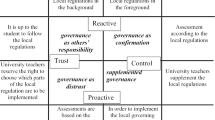Abstract
Studies have demonstrated that neoliberal governance dismantles professionals’ will to critique, counteracting efforts to improve quality by preventing professionals in all sectors of the labour market from grounding work in their professional convictions. Managing attempts at governance has therefore become an important professional competence. This paper investigates how higher education prepares students for work under neoliberal forms of control. How are they trained to analyse and describe the effects of governance and prepared to work with the standards, manuals and documentation that influence quality in their lines of work? ‘Interruptive focus group conversations’ were performed with students from various professional programmes at a Swedish university. Student reasoning about governance is explored using theories of governance and subjectification. The results demonstrate that students are aware of the ways in which their professions are governed, the need to conduct discretionary work, but do not have skills to deal with governance critically. This latitude for pedagogical intervention is underutilized.
Similar content being viewed by others
References
Abbott, A. (1988). The system of professions: An essay on the division of expert labor. Chicago: University of Chicago Press.
Agevall, L., & Jonnergård, K. (2007). Management by documents: A risk for de-professionalizing? In C. Aili & L.-E. Nilsson (Eds.), The individual in tension between organization and profession (pp. 33–55). Stockholm: Almqvist & Wiksell International.
Aili, C., & Nilsson, L.-E. (2015). Dual learning - A challenge for higher education in the new landscape of governance. Tertiary Education and Management, 21, 277–292. doi:10.1080/13583883.2015.1068367
Arum, R., & Roksa, J. (2011). Academically adrift: Limited learning on college campuses. Chicago: University of Chicago Press.
Ash, M. G. (2006). Bachelor of what, master of whom? The Humboldt myth and historical transformations of higher education in German-speaking Europe and the US. European Journal of Education, 41, 245–267.
Atkinson, D. (1997). A critical approach to critical thinking in TESOL. TESOL Quarterly, 31, 71–94.
Ball, S. J., & Olmedo, A. (2013). Care of the self, resistance and subjectivity under neoliberal governmentalities. Critical Studies in Education, 54, 85–96.
Barnett, R. (1999). Learning to work and working to learn. In D. Boud & J. Garrick (Eds.), Understanding learning at work (pp. 29–43). London: Routledge.
Becker, H. S., Geer, B., Hughes, E. C., & Strauss, A. L. (1961). Boys in white: Student culture in medical school. Chicago: University of Chicago Press.
Biesta, G. (2010). Good education in an age of measurement: Ethics, politics, democracy. Boulder, CO: Paradigm.
Bildtgård, T. (2002). Hur maten blev en risk: Medicinens bidrag till regleringen av det svenska ätandet [How food became a risk: Medicine and the regulation of Swedish eating]. Uppsala: Uppsala University.
Bok, D. (2009). Our underachieving colleges: A candid look at how much students learn and why they should be learning more. Princeton: Princeton University Press.
Burrage, M., & Torstendahl, R. (1990). Professions in theory and history. London: Sage.
Cooper, L., Orrell, J., & Bowden, M. (2010). Work integrated learning: A guide to effective practice. London: Routledge.
Davies, J., & Bansel, P. (2010). Governmentality and academic work: shaping the hearts and minds of academic workers. Journal of Curriculum Theorizing, 26, 5–20.
Evetts, J. (2009). New professionalism and new public management: changes, continuities and consequences. Comparative Sociology, 8, 247–266. doi:10.1163/156913309X421655
Evetts, J. (2013). Professionalism: Value and ideology. Current Sociology, 61, 778–796.
Forsell, A., & Westerberg, A. I. (2014). Adminstrationssamhället [Administration society]. Lund: Studentlitteratur.
Foucault, M. (1982). The subject and power. Critical Inquiry, 8, 777–795.
Foucault, M. (1990). The care of the self. The history of sexuality. London: Penguin.
Foucault, M. (2000). Governmentality. In J. D. Faubion (Ed.), Power: subjectivity and truth: The essential works of Michel Foucault 1954–1984 (pp. 201–222). London: Penguin.
Freidson, E. (2001). Professionalism, the third logic: On the practice of knowledge. Chicago: University of Chicago Press.
Gorman, E. H., & Sandefur, R. L. (2011). ‘Golden age’, quiescence, and revival: How the sociology of professions became the study of knowledge-based work. Work and Occupations, 38, 275–302. doi:10.1177/0730888411417565
Guile, D., & Griffiths, T. (2001). Learning through work experience. Journal of Education and Work, 14, 113–131.
Harvey, L. (2005). Embedding and integrating employability. New Directions for Institutional Research, 2005, 13–28.
Hasselberg, Y. (2013). In defence of discretion. In S. Rider, Y. Hasselberg, & A. Waluszewski (Eds.), Transformations in research, higher education and the academic market (pp. 137–144). Dordrecht: Springer.
Kuhn, D. (1999). A developmental model of critical thinking. Educational Researcher, 28, 16–46.
Lindgren, S.-Å. (1993). Den hotfulla njutningen: Att etablera drogbruk som ett samhällsproblem 1890–1970 [The menacing pleasure. Establishing drug use as a social problem 1890 to 1970. Stockholm: Symposium Graduale.
Lingard, B. (2013). The impact of research on education policy in an era of evidence-based policy. Critical Studies in Education, 54, 113–131.
Marková, I., Linell, P., Grossen, M., & Salazar Orvig, A. (2007). Dialogue in focus groups: Exploring socially shared knowledge. London: Equinox.
Parsons, T. (1939). The professions and social structure. Social Forces, 17, 457–467.
Power, M. (1997). The audit society: Rituals of verification. Oxford: Oxford University Press.
Rose, N. (1999). Governing the soul: The shaping of the private self. London: Free Association Books.
SFS (1992:1434). Högskolelagen [Higher Education Act]. Stockholm.
SFS (1993:100). Högskoleförordningen [Higher Education Ordinance]. Stockholm.
Strathern, M. (2000). The tyranny of transparency. British Educational Research Journal, 26, 309–321.
Author information
Authors and Affiliations
Corresponding author
Rights and permissions
About this article
Cite this article
Aili, C., Nilsson, LE. Preparing higher education students for the new landscape of governance. Tert Educ Manag 22, 249–265 (2016). https://doi.org/10.1080/13583883.2016.1196725
Received:
Accepted:
Published:
Issue Date:
DOI: https://doi.org/10.1080/13583883.2016.1196725




